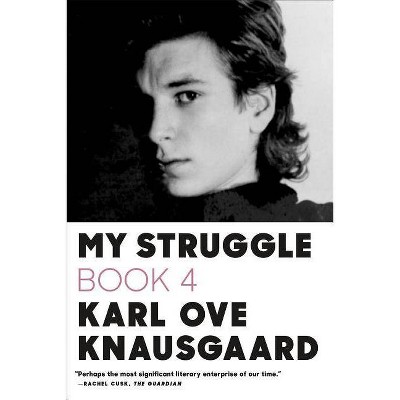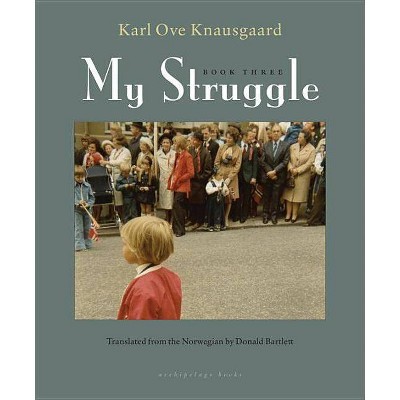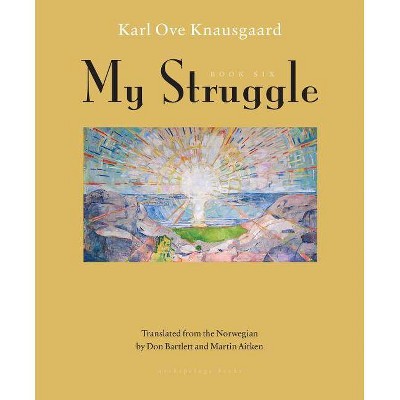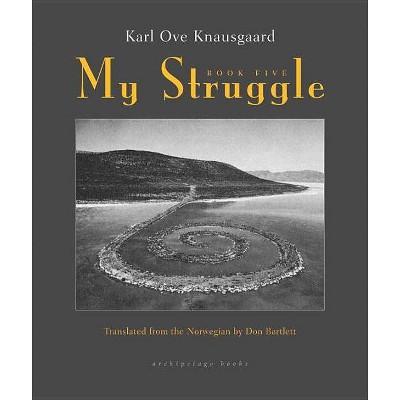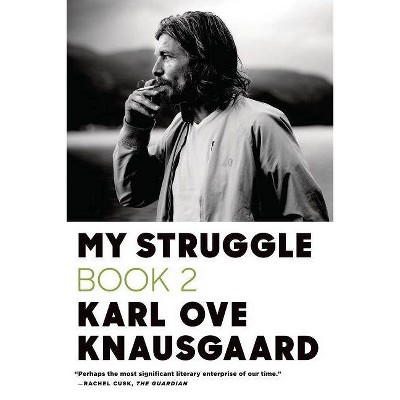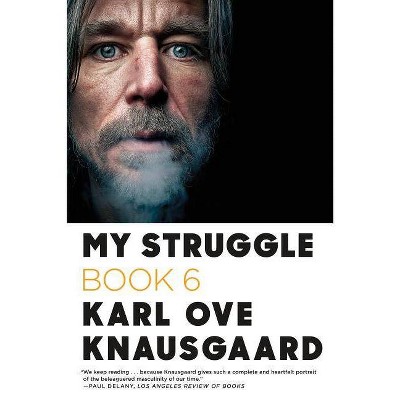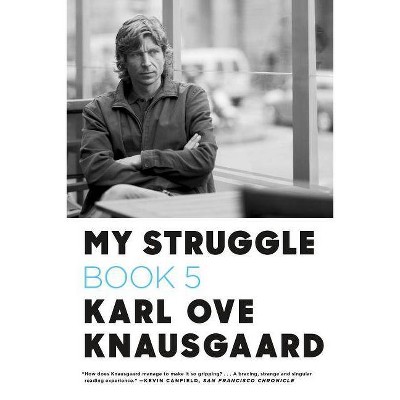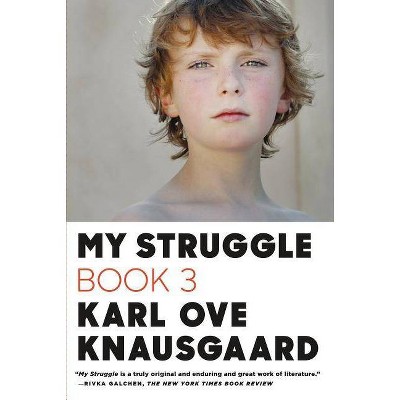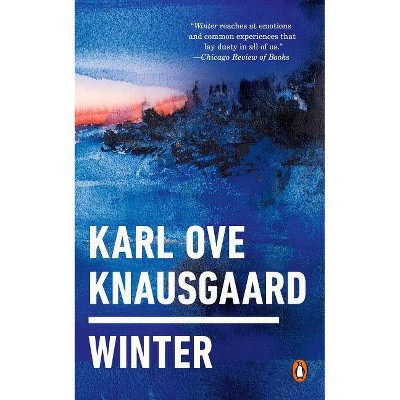My Struggle, Book Four - by Karl Ove Knausgaard (Hardcover)
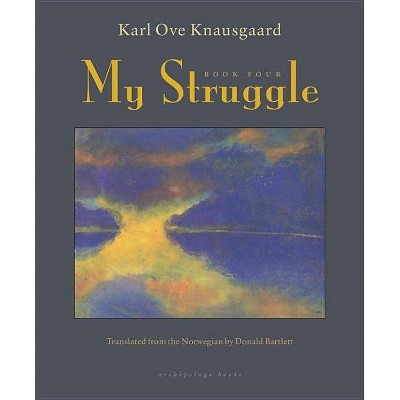
Similar Products
Products of same category from the store
AllProduct info
<p><b>A <i>New York Times</i> Bestseller</b> <p/>"<i>My Struggle: Book Four</i> is an elegiac kind of comic novel, and it is pure Karl Ove Knausgaard. This is to say, it comprises intimate descriptions of daily life, descriptions that build to something improbably greater than the sum of their parts. <b><i>-- </i>Dwight Garner in <i>The New York Times</i></b> <p/>The sheer accumulation of minutiae becomes hypnotic. Many times I've thought to myself: It's getting late, I'll stop reading now. But an hour on, I'm still turning the pages. <i>My Struggle</i> is addictive, whether the narrator is frying onions, engaging in drinking bouts that end in a fetal position on the bathroom floor, or meditating on evil. <b><i>-- The Wall Street Journal</i></b> <p/>Knausgaard is not a 'difficult' writer like Proust, Joyce or David Foster Wallace. He's pointedly unliterary. Anyone can understand what he's writing. And, paradoxically enough, his honest, obsessive self-absorption makes his life feel universal. As I was reading, every single subject that came up in my daily living -- parents, politics, education, Italian food, trees, even David Byrne -- reminded me of something in Knausgaard. His work makes you realize that each and every one of our lives contains rich enough material for a long, daunting book called <i>My Struggle</i>. <b><i>--</i> John Powers, <i> Fresh Air</i></b> <p/>Knausgaard's brooding Scandinavian obsessiveness has a way of getting under a reader's skin, not because his life is so exciting and eventful -- it isn't -- but because it's so familiar. He writes a clear prose that transforms ordinary events, detailing the span of his life with such directness that everything seems to be happening in real time. <b><i>-- Washington Post</i></b> <p/>I just finished the newest volume of <i>My Struggle</i>, the fourth of six, and it was marvelous, transporting. The whole sequence is maddening at times, yes, but also, beyond any question, something special and important... He does recapture the world, somehow; that's the thing, and it gives these strange, boring, hypnotic, luminous books almost a religious feeling, something like immanence. It's astonishing. If you haven't already, read them now. <b>-- Charles Finch, <i> Chicago Tribune</i></b> <p/><i>Book Four</i> is the swiftest, most neatly arced of the books thus far... Not since Jack Kerouac's "Big Sur" has a novelist depicted the terrors and highs of oblivion so well. <b>-- John Freeman, <i>The Boston Globe<br></i></b><br>My Struggle is engrossing almost in spite of itself: built on smoothly layered, quotidian details, Knausgaard's storytelling has an undeniable forward thrust that encourages the reader to compulsively explore the writer's inner consciousness. . . Book 4 is among the funniest of the volumes thus far published in English, in part because it captures the jumbled, absurd mind of the late adolescent man--pretentious, preening, sex-obsessed, fixated on maturity but not quite in possession of it. <b>-- Mark Athitakis, <i>Kirkus Reviews<br></i></b><br>Two thirds of the way into Knausgaard's mundane, transcendent six-book series on his (slightly fictionalized) life comes a portrait of the artist as a late adolescent -- defiantly skipping college to teach and write, without much success; dealing, often face-to-face, with the legacy of his father's violence and alcoholism while threatening to repeat his mistakes. With more drama and narrative arc than the first three books, it's a good entry point for the uninitiated. For devotees, it's another beautiful jigsaw piece in Knausgaard's great work and ordinary life. <b><i>-- </i>Boris Kachka at<i> Vulture.com<br></i></b><br>...Knausgaard's command of the traditional novelistic procedure is the reason these books are the opposite of dull, though on the face of it they should be. Knausgaard is always spinning a tale, always drawing the reader along with some romantic entanglement, sexual disaster, or emotional crisis. He feeds in atmosphere in just the right amounts; his pacing is flawless. How wonderful to read an experimental novel that fires every nerve ending while summoning in the reader the sheer sense of how amazing it is to be alive, on this planet and no other. <b><i>-- New York Times Book Review<br></i></b><br>Begun when he was 39, feeling intimations of mortality and a crushing desire to "write something exceptional one day," <i>My Struggle</i> is a colossus, a Proustian megabook of memory and family life; a poetic recall of the textures and terrors of childhood and boyhood; an unsparing glimpse into the mind of a man on the other side of that magical period in life, raising his own children; an exorcism of a terrifying and controlling father. <b><i>-- Literary Hub<br></i></b><br>Its repetitions have a darkly comic energy that is unique to <i>Book Four</i>... The narrator's companionable intelligence is one of the great pleasures of <i>My Struggle</i>. Yet almost none of that intelligence is gathered into concentrated thought... The result is a book that doesn't <i>think</i> in the way that we expect novels to. You wait for some sort of deeper consideration of what's happening, and it may come but more likely it will not--the book, like the life, keeps moving. <b><i>-- </i>Elaine Blair, <i>New York Review of Books</i></b> <p/>With My Struggle, Knausgaard makes a bid -- a huge, quixotic one -- to restore the possibility of awe, which stems less from the length of the book or its focus on his life than in its colossal ambitions for what a novel can achieve. <b><i>-- Los Angeles Review of Books<br></i></b><br>The events Knausgaard relates gain a raw intensity from the fact that the tale is told solely from the perspective of Karl Ove, and this, combined with Knausgaard's flair for storytelling, makes "Book Four" into the excellent composition that it is. . . He uses the page to explore his transition from a record-hoarding horny teenager to the great writer that he is today, and his provocative writing will likely strike a resonant chord with many who have in their own way struggled with growing up. <b><i>-- The Harvard Crimson<br></i></b><br>Given the size of the undertaking, the widespread critical acclaim and cultural buzz the series has generated, it has strong claim to be the great literary event of the 21st century. . . [Knausgaard] seems to punch a hole in the wall between the writer and reader, breaking through to a form of micro-realism and emotional authenticity that makes other novels seem contrived, "made up", irrelevant. . . [In Book Four] he documents his prolonged and calamitous attempts to dispose of his virginity during his late teenage years, a struggle sorely undermined by a chronic condition of premature ejaculation. It's very funny but also excruciatingly exposing. <b>--<i> The Guardian<br></i></b><br>Of the four books in this series published in English thus far, this one is the most rhetorically conventional: Knausgaard employs humor, irony and melodrama in ways that he studiously avoided in previous episodes. But he's done so not to pander but to criticize, echoing the mindset of a sex-obsessed and callow young man still in his teens and unshaped as a person and as a writer. And when the story arrives at its climax (and you can likely guess what that involves), Knausgaard uses the plainspokenness that defined his previous books to powerfully evoke the depth of his obliviousness, the hollowness of his triumph. An entertaining portrait of the artist as a young lout. <b><i>-- Kirkus Reviews </i>(Starred Review)<br></b><br>Unapologetically crude, this entry is the funniest and least self-conscious in the series to date; there's a humorous momentum propelling the narrative as Karl Ove attempts to lose his virginity. <b>-- <i>Publishers Weekly</i></b></p><p><i>My Struggle</i> is candid and compulsively readable, with moments of searing insight and bold shifts through narrative time. Its scope is both ambitious and modest; its range aggressive and tender. <b>-- <i>VICE </i></b> <p/>Knausgaard perfectly captures the heady mixture of elation and confusion to be found in late adolescence... <i>My Struggle</i> remains addictive, intensely funny and intensely serious. Like the young man here portrayed, it is 'full to the brim with energy and life'. <b><i>-- The Times Literary Supplement</i></b> <p/>Knausgaard is an advocate for writing the unsayable, for plumbing the deepest recesses of human consciousness and experience. As such, he's relentless in airing his most honest, and therefore often least admirable, self. I think it's precisely this that makes <i>My Struggle </i>such a generous, dealienating and necessary endeavor. <b>-- <i>Readings </i>(Australia)<br></b><br>[Book Four] is another substantial piece of the vast, contradictory, intriguing, solipsistic puzzle that is <i>My Struggle . . .</i> The aspect that . . . makes it genuinely compelling . . . is its ambitious attempt to establish a connection between Knausgaard's commonplace experiences and the grand philosophical and ideological currents of modernity, and in doing so to arrive at some kind of intimate understanding of the violent history that has been generated by those ideas. <b>-- <i>Sydney Review of Books<br></i></b><br>With each volume of <i>My Struggle</i> that is published in English, Knausgaard emerges more clearly, in all his human ambiguity. Volume Four presents a portrait of the artist as a young man, marinated in alcohol and sexual failure. It is awkward, painful, occasionally shocking and often very funny, particularly if you have ever been (or known) a teenage boy.<b> -- Hari Kunzru <br></b><br>It is one of the most important artistic projects of our time. <b>-- <i>Flavorwire<br></i></b><br>It's an utterly absorbing, possibly essential literary experience in any language... Somewhere in that space between ludicrous ambition and microscopic examination, the series spins literary straw into odd, but beautiful, gold.<b> -- Doug McLean, <i>Winnipeg Free Press</i></b></p><i>My Struggle</i> represents a monumental undertaking and a significant aspect of the early 21st-century literary zeitgeist... Knausgaard forces us to confront life on both a grand and intimate scale. If its only redeeming quality is to encourage readers to focus a bit more carefully on individual moments and form slightly better memories, then <i>My Struggle</i> is worth its (considerable) weight. <b>-- Connor Ferguson, <i>Libretto</i></b> <p/><p>Knausgaard's work is an ongoing fight against impermanence... the details accrete to make a thrilling and momentous record of one person's passage through time. <b>-- Catherine Holmes, </b><i><b>The Post and Courier</b> <p/></i>Who are the artistic geniuses of today?... I've been thinking about this lately -- who might last and why -- moved by immersion in two wildly differing bodies of work. The first is the much-discussed six-volume magnum opus 'My Struggle, ' in which the Norwegian writer Karl Ove Knausgaard slices the mundane details of his life the way Paul Sorvino sliced garlic in 'Goodfellas' -- into translucent rounds of prose that melt in your head rather than your mouth... Will people read Knausgaard in 100 years the way they read Proust, a much more lyrical, consciously artful literary narcissist? Impossible to say, but I'd bet on yes; the paradox of 'My Struggle' is that the mundane details are what make it timeless. The sequence late in volume 1, in which the author cleans out his dead alcoholic father's house, goes on for dozens of pages, way too long, yet in its length and fanatically recorded specifics it illuminates all the coming to terms a child can have with a parent. If people are willing to listen, I think the books may continue to speak. <i><b>-- The Boston Globe </b></i></p>
Price History
Price Archive shows prices from various stores, lets you see history and find the cheapest. There is no actual sale on the website. For all support, inquiry and suggestion messagescommunication@pricearchive.us
